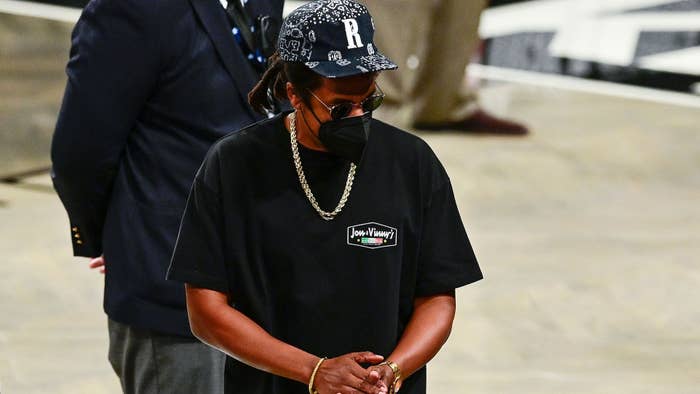
UPDATED 6:13 p.m. ET: A legal representative for Jonathan Mannion provided Complex with a statement in response to the lawsuit, which you can read in full below.
“Mr. Mannion has created iconic images of Mr. Carter over the years, and is proud that these images have helped to define the artist that Jay-Z is today. Mr. Mannion has the utmost respect for Mr. Carter and his body of work, and expects that Mr. Carter would similarly respect the rights of artists and creators who have helped him achieve the heights to which he has ascended.
See original story below.
Jay-Z is suing a photographer he worked with on one of his most iconic album cover shoots.
As initially reported Tuesday by TMZ, Hov claims in a new lawsuit that the photographer of the Reasonable Doubt album cover—Jonathan Mannion— is using his name and image without consent. In documents obtained by Complex, Jay says that Mannion, who shot the now-iconic image on the cover of his debut record, has been selling prints on his website without the rapper’s consent, and earning thousands of dollars from them in the process.
“Mannion has developed a highly-profitable business by selling copies of photographs of JAY-Z on Mannion’s website and retail store, and by selling licenses to others to use JAY-Z’s image,” the court documents read. “Mannion has done so on the arrogant assumption that because he took those photographs, he can do with them as he pleases. But JAY-Z never gave Mannion the right to use his likeness for these or any other purposes. And without that permission, Mannion has no legal right to do so. JAY-Z has asked Mannion to stop, but he refuses to do so.”
The suit also claims that Mannion—who has taken “hundreds of photos of Jay-Z since 1996”—is now demanding that Hov pay him “tens of millions of dollars to put an end to Mannion’s use of JAY-Z’s likeness.” Alex Spiro, an attorney for Jay, declined to comment for the story.
“It is no secret that JAY-Z has achieved iconic success, not just as a rap artist and record-company mogul, but in numerous other pursuits and as a businessman,” the suit also reads. “It is ironic that a photographer would treat the image of a formerly-unknown Black teenager, now wildly successful, as a piece of property to be squeezed for every dollar it can produce. It stops today.”
The lawsuit cites a T-shirt sold on the photographer’s website—which uses Jay’s name, among other rappers he has phototgraphed—and claims “Mannion has developed a business for himself” by selling photograph prints of JAY-Z on his site and “licensing JAY-Z’s image to others.” It also claims he has violated section 3344 of California Civil Code as well as California Common Law Right of Publicity.
“Mannion is also turning a profit on JAY-Z’s celebrity with other products, such as shirts that display JAY-Z’s name and slipmats (the circular piece of slippery cloth or synthetic material disk jockeys place on a turntable platter), which use JAY-Z’s image,” it adds.
If Jay wins the suit, he claims he is “entitled to recover punitive and exemplary damages” in a number not yet decided, as well as being worthy of a “preliminary and permanent injunction” making it so the artist doesn’t use his image again.

